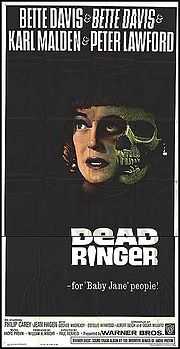Dead Ringer (1964 film)
| Dead Ringer | |
|---|---|
|
Theatrical release poster | |
| Directed by | Paul Henreid |
| Produced by | William H. Wright |
| Written by |
Story: Rian James Screenplay: Albert Beich Oscar Millard |
| Based on | La Otra aka Dead Pigeon |
| Starring |
Bette Davis Karl Malden Peter Lawford Philip Carey Jean Hagen |
| Music by | André Previn |
| Cinematography | Ernest Haller |
| Edited by | Folmar Blangsted |
Production company |
Warner Bros |
| Distributed by | Warner Bros. Pictures |
Release dates |
|
Running time | 115 minutes |
| Country | United States |
| Language | English |
| Budget | $1,200,000 |
Dead Ringer, also known as Who is Buried in my Grave? is a 1964 thriller film made by Warner Bros. It was directed by Paul Henreid from a screenplay by Oscar Millard and Albert Beich from the story La Otra by Rian James. The music score was by André Previn and the cinematography by Ernest Haller. The film stars Bette Davis, Karl Malden and Peter Lawford with Philip Carey, Jean Hagen, George Macready, Estelle Winwood, George Chandler and Cyril Delevanti.
The film marks the second time Davis played twin sisters, the first being in the 1946 film A Stolen Life. For this reason, Dead Ringer is sometimes mistakenly listed as a remake of A Stolen Life.[1]
Plot
At the funeral of her husband Frank, wealthy widow Margaret DeLorca (Bette Davis), meets up with her twin sister, downcast Edith Phillips (also played by Davis), from whom she has been estranged for 18 years. The two return to DeLorca's opulent mansion, where the two argue about their falling out over Margaret's marriage to DeLorca, who originally courted Edith but had an affair with Margaret. Margaret had told Frank she was pregnant and forced him into marriage. However, Edith finds out from Margaret's chauffeur (George Chandler) that Margaret was never pregnant, and becomes resentful. While Margaret now enjoys a life of ease and wealth, Edith is struggling financially. Edith's business, a cocktail lounge, is losing money and she is threatened with eviction for not paying her bills.
Later that day, Edith tells her sister to come to the cocktail lounge. When Margaret arrives, she admits there never really was a pregnancy, and Edith shoots her in the head. She then assumes Margaret's identity and makes it appear that Edith has committed suicide. While Edith looks like Margaret, the staff notice differences, such as the house's Great Dane hating Margaret but taking to Edith immediately, as well as Edith's smoking habit. Because of her failure to imitate to her sister's signature, Edith purposely burns her hand on a fire poker to cover her tracks.
Meanwhile, Edith's boyfriend, police sergeant Jim Hobbson (Karl Malden) visits "Margaret" several times, asking questions about the death of Edith, whom he loved. Edith's scheme runs into trouble when Margaret's lover Tony (Peter Lawford) sees through her disguise. Tony blackmails her for killing her sister, and receives very expensive jewelry as payment. Edith then learns that Margaret and Tony conspired to murder Frank by poisoning him with arsenic. Tony and Edith quarrel; when he threatens her, Margaret's Great Dane attacks and kills him.
Jim Hobbson has become suspicious about DeLorca's death and leads an investigation in which the police eventually exhume Frank's body and find traces of arsenic. When Jim arrives to arrest her, Edith confesses her true identity. Jim is repulsed and does not believe her, telling her "Edith would never hurt a fly."
Edith (as Margaret) is tried, found guilty of murder, and sentenced to death. As she is taken away from the courthouse, a troubled Jim approaches her and asks if she really is Edith. She reminds him that "Edith would never hurt a fly" and departs.
Cast
|
|
Notes
The film takes place in Los Angeles and Beverly Hills. The interior scenes took place inside and outside the grounds of the Greystone Mansion in Beverly Hills. The bar scene took place at the corner of Temple and Figueroa in downtown Los Angeles. The burial scene took place inside the Rosedale Cemetery in Los Angeles.
The jazz combo in Edie's Bar was composed of electronic organist Perry Lee Blackwell and drummer Kenny Dennis, both noted musicians, but uncredited in the film.
This was the final film of cinematographer Ernest Haller. The trick process shots in A Stolen Life were created by him, and he would improve upon the process here. Makeup artist Gene Hibbs was also hired due to his unique talent for making older actresses look younger through a "painting" technique.[2]
The plot of Dead Ringer had already been made into a Mexican film in 1946 as La Otra, directed by Roberto Gavaldón and starring Dolores del Río. Dead Ringer itself was remade in 1986 as Killer in the Mirror, a made-for-television movie starring Ann Jillian.[3]
References
- ↑ "Dead Ringer Movie Review". A Life At The Movies. October 14, 2010.
- ↑ http://www.tcm.com/tcmdb/title/3877/Dead-Ringer/articles.html
- ↑ http://www.allmovie.com/movie/dead-ringer-v77138
External links
- Dead Ringer at the Internet Movie Database
- Dead Ringer at AllMovie
- Dead Ringer at the TCM Movie Database
